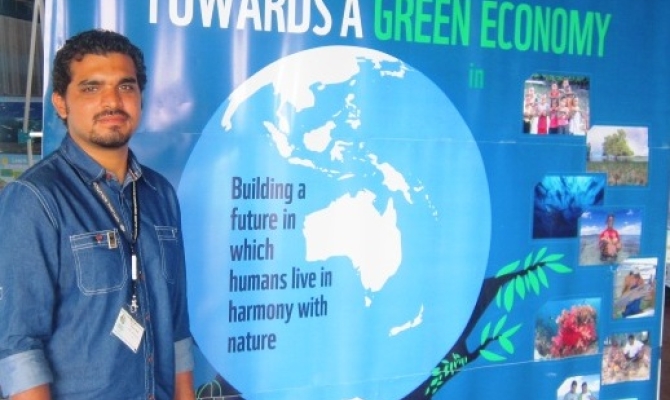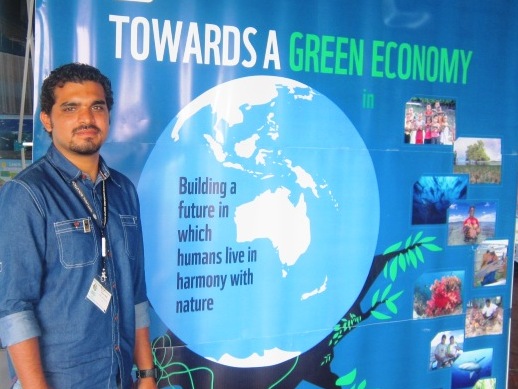
Island and Ocean Ecosystems
By Maryann Lockington, journalism student at USP
3 December 2013, Suva Fiji - When Mr. Hamza Malik left Lahore in Pakistan to come on an internship at the World Wide Fund for Nature South Pacific Office (WWF-SP) in Suva, he knew he was coming for new experiences, especially as it was his first time to be over the ocean.
Mr. Malik hails from Bahawalpur in Punjab, a city of about 800,000 people located in the central western region of Pakistan, several hundred kilometres away from Karachi and the Arabian Sea.
Mr.Malik was among those who gathered in Suva this week for the regional nature conservation conference.

He is working in Fiji to develop the eco-internship programme at WWF-SP. He spoke about his experiences recounting some highlights of the past two months.
When shooting his documentary in Yadua Taba Island in Bua, Mr. Malik said the first turtle they caught was named after him.
The lead up to meeting Hamza the turtle began around Mr. Malik's passion for photography and documentary filming. During his two months in Fiji, Mr. Malik has travelled to at least six islands including Yadua Taba, Yaqaqa, Kavea and Yadua.
"Camera work here was a challenge because I had to learn how to film in the tropics," he said. He was a part of the team that went to Yadua Island for turtle monitoring so he shot some footage for his documentary film.
"I learnt how to tag turtles," he said. "We also did sea grass monitoring because that is their main diet."
Mr. Malik filmed scenes during the turtle-tagging and the first big turtle tagged was named after him. He was also part of the team that carried out beach profiling at Yadua Taba Island for the turtle nesting grounds.
"We went to Yadua Taba and that was also a sanctuary for crested iguanas," he said. Mr. Malik said he loved working with young people and got the opportunity to work with tertiary and high school students.
"It is fascinating how youth here are so aware of their environment compared to other parts of the world," he said. "It is very important to work with students because we need to instill these values in them so that they can be our future ambassadors."
At the conference, Mr. Malik has been immersed in listening to the speakers and talking with those interested in the WWF-SP display booth. Mr. Malik said education on environmental awareness and civic responsibility is important.
"It is the first time for me to see NGOs on a single platform and I think it is important that we work in a partnership as a family," he said. He also talked about some of his experiences in Fiji and meeting new friends.
"I enjoy the night grog sessions and eating fish every day," he joked. "It's been a lifetime experience and I have my first-ever snorkeling gear."
Mr. Malik expressed his love for the culture, food and the people.
"It's been fascinating having hands-on experience with island communities," he said. "Conservation is important and I've learnt about rain water storage and water management."
Mr. Malik will be leaving in February 2014 and he hopes to make use of what he has learnt here in Pakistan.
Maryann Lockington is a member of the Media Team providing coverage of the 9th Pacific Islands Conference on Nature Conservation and Protected Areas from 2 to 6 December in Suva, Fiji. This is a partnership between the Fiji National University (FNU), University of the South Pacific (USP), SPREP and Pacific Islands News Association (PINA) whereby a team of 10 journalism students are mentored by senior reporters as they cover the conference. This activity is funded by the Pacific Assistance Media Scheme (PACMAS).
3 December 2013, Suva Fiji - When Mr. Hamza Malik left Lahore in Pakistan to come on an internship at the World Wide Fund for Nature South Pacific Office (WWF-SP) in Suva, he knew he was coming for new experiences, especially as it was his first time to be over the ocean.
Mr. Malik hails from Bahawalpur in Punjab, a city of about 800,000 people located in the central western region of Pakistan, several hundred kilometres away from Karachi and the Arabian Sea.
Mr.Malik was among those who gathered in Suva this week for the regional nature conservation conference.

He is working in Fiji to develop the eco-internship programme at WWF-SP. He spoke about his experiences recounting some highlights of the past two months.
When shooting his documentary in Yadua Taba Island in Bua, Mr. Malik said the first turtle they caught was named after him.
The lead up to meeting Hamza the turtle began around Mr. Malik's passion for photography and documentary filming. During his two months in Fiji, Mr. Malik has travelled to at least six islands including Yadua Taba, Yaqaqa, Kavea and Yadua.
"Camera work here was a challenge because I had to learn how to film in the tropics," he said. He was a part of the team that went to Yadua Island for turtle monitoring so he shot some footage for his documentary film.
"I learnt how to tag turtles," he said. "We also did sea grass monitoring because that is their main diet."
Mr. Malik filmed scenes during the turtle-tagging and the first big turtle tagged was named after him. He was also part of the team that carried out beach profiling at Yadua Taba Island for the turtle nesting grounds.
"We went to Yadua Taba and that was also a sanctuary for crested iguanas," he said. Mr. Malik said he loved working with young people and got the opportunity to work with tertiary and high school students.
"It is fascinating how youth here are so aware of their environment compared to other parts of the world," he said. "It is very important to work with students because we need to instill these values in them so that they can be our future ambassadors."
At the conference, Mr. Malik has been immersed in listening to the speakers and talking with those interested in the WWF-SP display booth. Mr. Malik said education on environmental awareness and civic responsibility is important.
"It is the first time for me to see NGOs on a single platform and I think it is important that we work in a partnership as a family," he said. He also talked about some of his experiences in Fiji and meeting new friends.
"I enjoy the night grog sessions and eating fish every day," he joked. "It's been a lifetime experience and I have my first-ever snorkeling gear."
Mr. Malik expressed his love for the culture, food and the people.
"It's been fascinating having hands-on experience with island communities," he said. "Conservation is important and I've learnt about rain water storage and water management."
Mr. Malik will be leaving in February 2014 and he hopes to make use of what he has learnt here in Pakistan.
Maryann Lockington is a member of the Media Team providing coverage of the 9th Pacific Islands Conference on Nature Conservation and Protected Areas from 2 to 6 December in Suva, Fiji. This is a partnership between the Fiji National University (FNU), University of the South Pacific (USP), SPREP and Pacific Islands News Association (PINA) whereby a team of 10 journalism students are mentored by senior reporters as they cover the conference. This activity is funded by the Pacific Assistance Media Scheme (PACMAS).